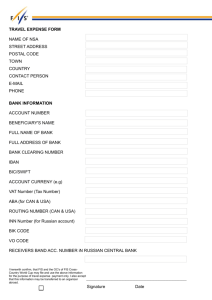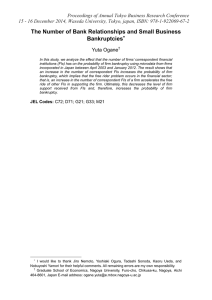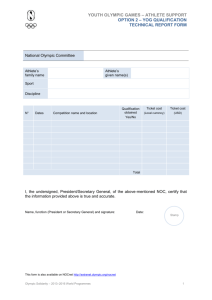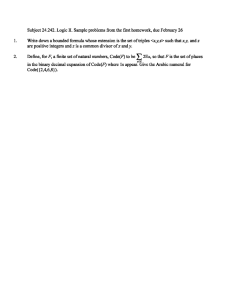2006.3.15. RIETI Court of Arbitration for Sport オリンピック仲裁にみるスポーツ界の現状
advertisement
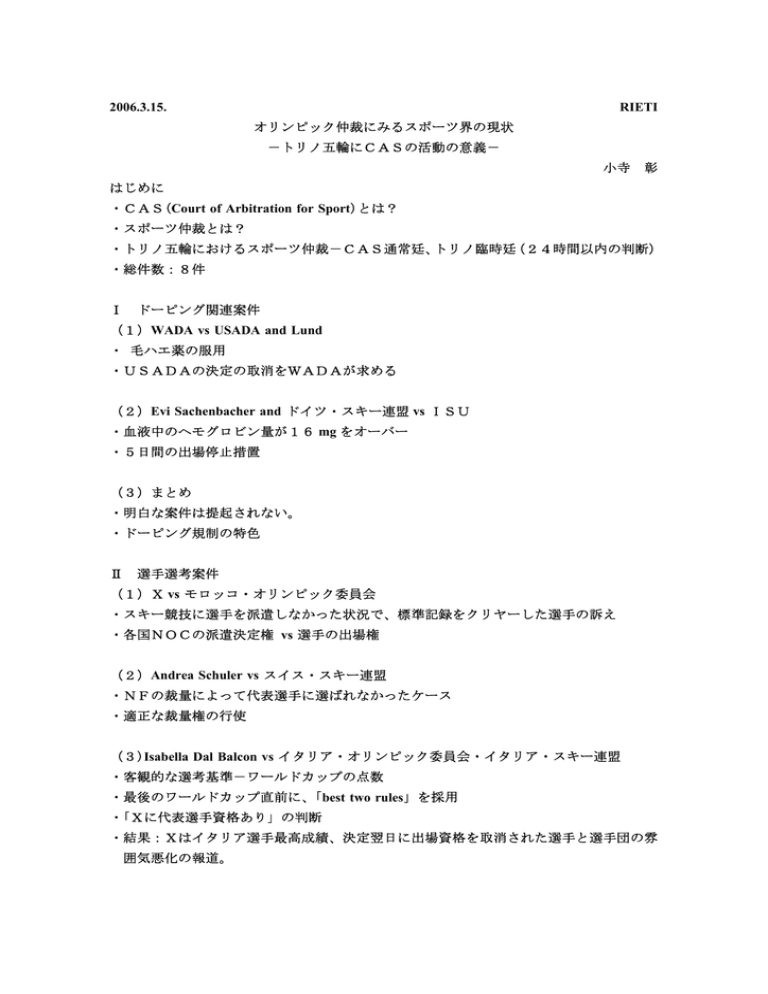
2006.3.15.
RIETI
オリンピック仲裁にみるスポーツ界の現状
-トリノ五輪にCASの活動の意義-
小寺
彰
はじめに
・CAS(Court of Arbitration for Sport)とは?
・スポーツ仲裁とは?
・トリノ五輪におけるスポーツ仲裁-CAS通常廷、トリノ臨時廷(24時間以内の判断)
・総件数:8件
Ⅰ
ドーピング関連案件
(1)WADA vs USADA and Lund
・ 毛ハエ薬の服用
・USADAの決定の取消をWADAが求める
(2)Evi Sachenbacher and ドイツ・スキー連盟 vs ISU
・血液中のヘモグロビン量が16 mg をオーバー
・5日間の出場停止措置
(3)まとめ
・明白な案件は提起されない。
・ドーピング規制の特色
Ⅱ
選手選考案件
(1)X vs モロッコ・オリンピック委員会
・スキー競技に選手を派遣しなかった状況で、標準記録をクリヤーした選手の訴え
・各国NOCの派遣決定権 vs 選手の出場権
(2)Andrea Schuler vs スイス・スキー連盟
・NFの裁量によって代表選手に選ばれなかったケース
・適正な裁量権の行使
(3)Isabella Dal Balcon vs イタリア・オリンピック委員会・イタリア・スキー連盟
・客観的な選考基準-ワールドカップの点数
・最後のワールドカップ直前に、「best two rules」を採用
・「Xに代表選手資格あり」の判断
・結果:Xはイタリア選手最高成績、決定翌日に出場資格を取消された選手と選手団の雰
囲気悪化の報道。
Ⅲ
スポーツ仲裁興隆の背景
(1)スポーツ法・スポーツ仲裁の法的構造
・スポーツ競技の公共性=選手の出場権
・関係団体の私的自治には任せられない-ルールに則った運営
法学的方法による審査
(2)日本の状況
・JSAA(日本スポーツ仲裁機構)の設立-2003年
・日本の後進性:選手の「権利」への嫌悪
「自分たちは選手のことを考えて行動している。」
「スポーツを知らない人間に審査さ
れたくない。」等々
・高額報酬について
法的に審査に服すべきだという観念の芽生え-プロ、五輪。
おわりに
・スポーツ競技大会の公共性・選手の権利認識の必要
・スポーツ法の専門家養成の必要-「スポーツ法学」
以上
[別表]提訴事件一覧
1.THE WORLD ANTI-DOPING AGENCY (WADA) REQUESTS THE COURT OF
ARBITRATION FOR SPORT (CAS) TO IMPOSE A TWO-YEAR SUSPENSION
AGAINST THE US ATHLETE ZACH LUND
2.THE SWISS SNOWBOARDER ANDREA SCHULER TO CHALLENGE HER
NON-SELECTION
FOR THE
OLYMPIC GAMES BEFORE THE COURT
OF
ARBITRATION FOR SPORT (CAS)
3.THE GERMAN SKI FEDERATION AND EVI SACHENBACHER TO CHALLENGE
START PROHIBITION BEFORE THE COURT OF ARBITRATION FOR SPORT (CAS)
4.CANADIAN OLYMPIC COMMITTEE TO CHALLENGE THE RESULTS OF THE
LADIES' SHORT TRACK EVENT BEFORE THE COURT OF ARBITRATION FOR
SPORT (CAS)
5.“GRANDMA LUGE” TO FILE AN APPEAL WITH THE CAS AD HOC DIVISION
6. THE ITALIAN SNOWBOARDER, ISABELLA DEL BALCON, TO CHALLENG
HER NON-SELECTION FOR THE WINTER OLYMPICS BEFORE THE COURT OF
ARBITRATION FOR SPORT (CAS)
7 . THE AUSTRALIAN OLYMPIC COMMITTEE (AOC) TO REQUEST THE
PERMISSION TO ENTER A TEAM FOR THE FOUR-MEN BOBSLEIGH EVENT
8.M. Samir Azzimani ("Demandeur") v. Comité National Olympique Marocain
COURT OF ARBITRATION FOR SPORT (CAS)
TRIBUNAL ARBITRAL DU SPORT (TAS)
Ad hoc Division – XX Olympic Winter Games in Turin
CAS arbitration N° CAS OG 06/004
FINAL AWARD
In the arbitration between
Deutscher Skiverband (German Ski Association)
Evi Sachenbacher – Stehle
Represented by: Dr Ernst Jakob, German Team Physician
Mr Felix Weinfurtner, Security Officer
..........................................................................................................................................
(the "Applicants")
and
International Ski Federation (FIS)
Represented by: Ms Sarah Lewis, FIS Secretary General
Prof Bengt Saltin, FIS Chairman Medical Committee – “Doping”
..........................................................................................................................................
(the "Respondent")
and
Mr François Carrard, Counsel, IOC
Mr Howard Stupp, Director of Legal Affairs, IOC
Mr Huw Roberts, Independent Observer Program of WADA
..........................................................................................................................................
(the "Observers")
*****
CAS arbitration N° CAS OG 06/004
1.
Facts
1.1.
Ms Evi Sachenbacher-Stehle, one of the Applicants (hereafter referred to as the
"Athlete") is a cross-country skier representing Germany at the XX Olympic Games
hosted in Turin.
1.2.
The International Ski Federation ("FIS"), the respondent, is the International Sport
Federation representing cross-country, ski jumping, nordic combined, alpine skiing,
freestyle skiing and snowboarding events at the Olympic Games. Among its roles,
the FIS is responsible for enforcing the FIS Anti-Doping Rules.
1.3.
On 9 February 2006, the Athlete was subjected to a Blood Screening/Testing as a
part of a Full Field testing by the FIS. The Blood Testing Report revealed an
“Elevated Haemoglobin Value”. As a result a “Notification of Start Prohibition” was
issued by the FIS to the Athlete pursuant to the FIS Procedural Guidelines
2005/2006 to the FIS Anti-Doping Rules ("Guidelines") under Rule FIS B.4.2.
1.4.
Under this Start Prohibition, the Athlete is prohibited from participating in any events
between 9 February 2006 to 13 February 2006 (inclusive). As a result of this
prohibition, the Athlete would be forced to miss her first Olympic Games event on 12
February 2006.
1.5.
In response to the notification of the Start Prohibition, the Applicants filed an
application with the Court of Arbitration for Sport ad hoc Division (CAS) on 10
February 2006.
2.
Legal aspects
2.1.
Procedure
2.2.
Legal framework
2.2.1. These proceedings are governed by the CAS Arbitration Rules for the Olympic
Games (the "CAS ad hoc Rules") enacted by the International Council of
Arbitration for Sport ("ICAS") on 14 October 2003. They are further governed by
Chapter 12 of the Swiss Private International Law Act of 18 December 1987 ("PIL
Act"). The PIL Act applies to this arbitration because the seat of the ad hoc
Division and of each Panel is in Lausanne, Switzerland, pursuant to Art. 7 of the
CAS ad hoc Rules.
2.2.2. The jurisdiction of the CAS ad hoc Division arises out of the entry form signed by
each and every participant in the Olympic Games as well as out of Rule 61 of the
Olympic Charter.
2
CAS arbitration N° CAS OG 06/004
2.2.3. Under art. 17 of the CAS ad hoc Rules, the Panel must decide the dispute
"pursuant to the Olympic Charter, the applicable regulations, general principles of
law and the rules of law, the application of which it deems appropriate.”
2.2.4. According to art. 16 of the CAS ad hoc Rules, the Panel has "full power to
establish the facts on which the application is based."
2.2.5. Neither party disputes the jurisdiction of the Panel to hear the matter and make a
final and binding determination. At the time of the hearing both parties confirmed
the jurisdiction of CAS.
3.
Relevant Provisions
3.1.
The maximum tolerated values under the guidelines in Rule FIS B.4 "Start
Prohibition" are a haemoglobin ("Hb") blood reading of less than 17.0 Hb (mg/ml) for
men and 16.0 Hb (mg/ml) for ladies.
3.2.
Paragraph FIS.B.4.2 of the Guidelines provides that:
If an athlete shows a haemoglobin value that is equal to or exceeds the above values
after the two consecutive measurements, the athlete will be notified by the
representative of the Jury that he/she is not allowed to start any competitions for five
consecutive days, including the day on which the test took place: e.g. if the blood test
takes place on Monday the Athlete will not be permitted to start again until Saturday
(and then only subject to the results of a new blood test, see FIS. B.4.5).
3.3.
The Blood Testing of the Athlete specimen on the 9th February test revealed a first
Blood Value reading for Hb of 16.5 mg/ml and a second reading of 16.4 mg/ml.
3.4.
Since the Athlete's reading exceeded the 16.0 threshold under the Guidelines, the
Athlete was prohibited from participating in an event for five consecutive days.
3.5.
It should be noted that the policy reason for the prohibition is stated in paragraph
FIS B.4.3 where it says, “This prohibition from participating in the competition (s) is
not a sanction, but is considered a protection of the health of the Athlete”.
4.
Discussion
4.1.
The essence of the submission on behalf of the Athlete is that she should receive a
dispensation from the FIS Hb rule (upper limit of less than 16.0 for ladies) for the
duration of the Olympic Games. It is claimed that she has a naturally high elevated
level of Hb.
4.2.
The Athlete in 2003, 2004 and 2005 applied for a dispensation under FIS.B.4.8 of
the FIS Guidelines. No dispensation has been granted to date. Although, one other
German cross-country skiing athlete on an application to the FIS has been given a
3
CAS arbitration N° CAS OG 06/004
dispensation.
4.3.
The Athlete seeks from this Panel a declaration that the Report of 6 September
2005 from the University Hospital in Tübingen by Dr Sökler, a specialist in
Haematology, should be recognised as establishing that she had an Hb value of
14.9 g/100ml with no indication of a haematological disease. This evaluation was
done at the request of the German Ski Association pursuant to the FIS Guideline
B.4.8.
4.4.
Following the initial review of Dr. Sökler’s report of September 6th in which the
information was not accepted by the FIS as forming the basis for a dispensation,
FIS agreed to undertake a further review at a later date.
That was done in
Copenhagen on 9 January 2006 with representatives’ present from the German Ski
Association, the German National Anti-Doping Agency and the FIS. Dr. Ernst Jakob
was a representative for the German Ski Association. He also presented the case
before this Panel. Also present was Professor Bengt Saltin who is the Chairman of
the FIS Medical Committee for doping. He was also present before the Panel.
4.5.
The FIS has put in place a blood-profiling program that stores Hb in blood data for
FIS athletes. As a consequence they have considerable data on the Athlete’s Hb.
Testing under the program has been conducted during the last four ski seasons.
4.6.
Dr Jakob provided his chart of Hb readings for the Athlete, in support of his
submission of a naturally high elevated level of Hb. In the second look and
reconsideration process undertaken by the FIS, Dr Jakob’s data was not accepted
as establishing his proposition. The Panel relies upon the data collected by the FIS
as being more reliable and comprehensive than the more selective data of Dr Jakob.
4.7.
Professor Saltin indicates that the pattern, which he presented in graph format of the
tests, indicates that the Athlete’s Hb concentration varies during the year and
between competitions. Such variability is uncommon among the skiers participating
in FIS World Cup and other international events. The Hb readings up to the time of
the meeting on the 9th of January had never exceeded 15.7, and that particular
reading was back in December 2001. The December 2005 readings before the 9th
of January meeting were 14.8 and 14.5.
The mean of that four-year accumulation
of data was 14.8 with a maximum value of 15.7 and a minimum value of 14.1. This
data according to Professor Saltin represents a modestly elevated Hb when the
mean is considered in comparison to the general female population.
4.8.
In 2006 there were two further Hb tests of 15.0 on 13th of January and 15.6 on the
4/5th of February. Professor Saltin suggested those numbers matched the historical
profile for the Athlete. These post Copenhagen meeting readings were both taken
4
CAS arbitration N° CAS OG 06/004
at high altitude resorts in Italy and Switzerland. Altitude is known to have a modest
elevating impact on the Hb readings. Then there is the test at the Olympic Games
that brought about this Appeal.
4.9.
On 9 February 2006 the Athlete was tested in the evening at the Olympic Village.
The two readings at that time were 16.5 and 16.4. They are the highest readings in
the more than 4-year historical profile. They have also risen sharply compared to
the readings at the time of the Copenhagen meeting and even over the altitude
readings after that meeting. The Olympic Games readings are taken at middle
altitude at the Games location and are remarkably inconsistent with the historical
and the recent readings leading up to the Games.
4.10.
The purpose of reciting the historical facts is to give background to the present
readings, which we are asked to nullify by cancelling the Notification of Start
Prohibition. The effect of that Prohibition is to preclude the Athlete from competing
in an event on the 12th of February. Therefore, she seeks to cancel the Notification
and that we issue such an order to the FIS.
4.11.
The relief requested presupposes that we find the Athlete to have a high naturally
elevated level of Hb. Since 2003 requests have been made each year to issue a
dispensation for a naturally elevated high level of Hb for this Athlete. All requests,
including a second look in January of this year, have been unsuccessful in
persuading the FIS that the Athlete has a naturally high elevated level of Hb. FIS
does agree that this Athlete does have a modestly elevated level of Hb but it is not
sufficient to justify issuing a dispensation pursuant to Rule FIS B.4.8. Far be it for
this Panel to substitute its views to those of the experts who have declined to grant
the dispensation to this Athlete for a naturally high elevated level of Hb over the past
3 years. We are being asked to make a medical expert’s judgement through the
guise of cancelling a Notification of Start Prohibition. It is not for this Panel to
perform an evaluation similar to that contemplated by the FIS B.4.8, which would
apply for the duration of the Olympic Games.
4.12.
Dr. Jakob has several objections to the FIS Start Prohibition Rules. It is submitted
that the Hb limits are not health rules as described by FIS but are arbitrary. In any
event the limit should not be applied to an athlete who has a naturally high elevated
level of Hb because it does not represent a health risk for such an athlete. This
Panel has already declined to undertake a review of experts similar to that required
by FIS rule B.4.8. Therefore, the Panel finds no reason to deviate from the
conclusion of the FIS that the athlete does not have a naturally high level of HB. Nor
does this Panel find that the limits established by the FIS are arbitrary when they are,
5
CAS arbitration N° CAS OG 06/004
as explained by Professor Saltin, established in co-operation with WADA.
4.13.
Dr. Jakob further submits that to the extent the test is a health test the Athlete is not
unhealthy and is fit to participate. That submission like the prior one is predicated
on the assumption that the Athlete has a naturally elevated high level of Hb. In
these reasons we have already found that this is not to be the case. Therefore, this
submission must also fail.
4.14.
In closing the Panel notes, that while it has rejected the construction arguments in
regard to the Rules put forward by Dr. Jakob, the Rules could be drafted with
greater precision. We also note that it came to light during the hearing that the blood
test followed by a urine sample contemplated by the Rules is a bifurcated procedure
at the Olympic Games. The FIS has responsibility for obtaining a blood sample and
the IOC must obtain the urine sample. Better co-ordination of this procedure is
required to ensure that the urine sample is taken, when required, immediately after
the blood sample and not the next day as occurred in this case. However, beyond
noting those points we find no basis for determining that there is evidence, or a role
for the Panel nor medical justification to do what the Applicant has requested.
4.15.
For all the foregoing reasons the Application is denied.
6
CAS arbitration N° CAS OG 06/004
5.
Decision
On the basis of the foregoing facts and legal aspects, the ad hoc Division of the Court of
Arbitration for Sport renders the following decision:
1.
The application filed by Ms Evi Sachenbacher-Stehle and Deutscher Skiverband
against the International Ski Federation is denied.
2.
The present decision is rendered without costs, in accordance with Art. 22 of the CAS
Arbitration Rules for the Olympic Games.
Turin, 12 February 2006
THE AD HOC DIVISION OF THE COURT OF ARBITRATION FOR SPORT
President of the Panel
Richard H. McLaren
Kaj Hober
Akira Kotera
Arbitrator
Arbitrator
7
!
$
$
$
$
"
#
"
"
%
"
%
%
"
%
&'()
&'(+
&'((
&'('
&''.
&''&
&''*
&''&''/
&'',
&'')
&''+
&''(
&'''
*...
*..&
*..*
*..*../
%
&1
&
,
,
+
&&'
&&.
&.
*.
&(
/*
-*
+,
/*
(&.+
*+&
&
'
/
)
,
)
&/
+
&
*
&
&
.
*
.
*
(
&*
'
&&(
*,
*+
&+
&*&
*.
/,
-+)
/*
()
&.'
*+&
&1
*1
&
&
&
.
.
&
.
&
&
*
.
.
*
&
&
.
&
.
*
&
&
&
,
&*
+
)
(
&)
&.
-,
**
)&
*(
+-'
++
0
&'',
2
*1
&
*
.
&
&
/
&*
)
,
)
&)
&.
-*&
).
*(
+.
-(
++
2
3
2
4&'')!&''(!*...!*..*
&'',!
4&'')!&''(!*...!*..*
*../1
5
*../1
2
4**
&''/16
-&
*../
5
47
8
"9
8
"
8
**!&''/1
-& $
*../
*
/
+
/
(
,
&.
'
)&
'
(
&.
&&
--
*/
,,
-*
))
/)
*,*
-
&
*
-
&
&
.
-
*
.
.
)
.
,
.
&,
.
(
.
&.
(
&)
&.
-,
**
)&
*(
+-
(*
++
/
*
/
/
-
/
-
)
&(
*(
&
-
)
)
(
&&
&&
+
(
*,
.
.
.
.
.
.
.
.
&
&/&
"
8
"
8
"
8
8
"8
"
-& &* ./ " 8
-& &* ./
